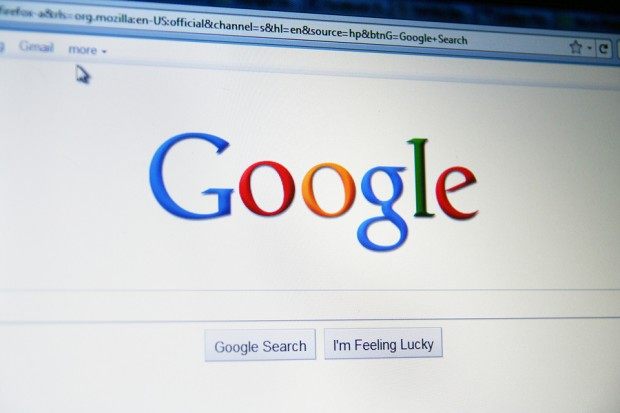The European Union escalated its four-year- old probe into Google Inc., accusing the Internet giant of abusing its dominance of the search-engine market and starting a new investigation into its Android mobile-phone software.
The European Commission sent a “statement of objections” to Google that alleges the company unfairly favors its own comparison shopping service above rivals. Regulators, who have the power to impose fines, will also look at Google’s contracts with phone and tablet makers to check if they are forced to use the company’s services or blocked from adopting modified versions of Android.
“If you cannot be found” on the Internet, “you cannot do business,” EU Competition Commissioner Margrethe Vestager told reporters at a Brussels press conference on Wednesday. “When you look for something, you expect to get the best possible answer to your query.”
The EU’s patience with Google has run out after three settlement bids failed to satisfy critics, who said the Mountain View, California-based company was wielding its power over search results to unfairly promote its own services and paid ads. The Android inquiry opens a new front that may hamper Google’s bid to gain a stranglehold on the mobile ad market.
10 Weeks
Amit Singhal, senior vice president of Google Search, said that the company “strongly” disagrees with the need to issue an antitrust complaint and will make that case in response to the EU statement of objections.
On shopping, “there’s a ton of competition” such as Amazon.com Inc. and EBay Inc., Singhal said in a blog posting.
Google has 10 weeks to respond to the EU’s objections and can seek a closed hearing with regulators to make its case.
Sending antitrust objections, which lay out where the EU thinks Google is breaking the law, pushes the investigation into new territory. Apart from the risk of fines, it may result in demands for Google to change its behavior. Any order for it to change how search results are generated or how advertising is displayed may affect revenue.
“Every road is open,” Vestager said, stating that Google can still escape fines if it manages to put together a settlement offer addressing the EU’s concerns.
The EU said it’s concerned that Google doesn’t subject its shopping service to its algorithm which ranks search results on quality and relevance to the user.
“We do not wish to interfere with screen design, how things are presented on the screen or how the algorithm works, Vestager told reporters. “This is not what we are thinking about. What we would like to see is that shoppers are able to see the best shopping results.”
Broader Precedent
The case into Google Shopping may also set a broader precedent for other services, the EU’s antitrust chief said. Regulators are still looking at Google’s behavior in search services for flights, travel and mapping, she said.
Its probe into other concerns about Google’s search advertising, such as exclusivity requirements and “undue restrictions” on advertisers, continues, it said. The EU is also looking at the legality of Google’s copying of rivals’ web content.
The European market contributes about 35 percent of Google’s revenue, according to Carlos Kirjner, a New York-based analyst at Sanford C. Bernstein & Co. Its market share in search exceeds 90 percent in most European markets, compared with about 65 percent in the U.S.
EU U-Turn
The EU’s move is a U-turn from earlier efforts to seek a settlement, which would have seen officials drop the investigation if Google made minor changes to its search pages. Negative feedback from companies, as well as criticism from French and German politicians, forced the EU ditch an accord last year.
The EU has been probing allegations since 2010 that Google’s search page isn’t fair when people seek services online. Microsoft Corp., Expedia Inc., publishers and others have asked the EU to examine complaints that Google favors its own services over competitors and hinders specialized search engines that compete with it.
The EU’s move “is about ending Google’s ability to manipulate its unprecedented power to its own financial ends and to the detriment of consumers and innovation,” said Shivaun Raff, chief executive officer of Foundem, a shopping comparison website and one of the first companies to complain to the EU. The company is also suing Google for damages.
Android Case
Regulators have been looking at Google’s Android software for mobile phones since 2013 after receiving a complaint from an industry group backed by Microsoft and Nokia Oyj.
Google said in a separate statement that its partner agreements with mobile-phone makers are voluntary.
“We understand that with success comes scrutiny,” Google’s Hiroshi Lockheimer, VP of engineering for Android, said in a blog posting. “But it’s not just Google that has benefited from Android’s success. The Android model has let manufacturers compete on their unique innovations.”
The EU also got a complaint last year from independent record labels that targeted Google’s YouTube online video site, alleging that Google threatened to block artists’ videos during contract talks for a streaming service.
–With assistance from Brian Womack in San Francisco and Andrew Clapham, Stephanie Bodoni and Gaspard Sebag in Brussels.





















 Viewpoint: Runoff Specialists Have Evolved Into Key Strategic Partners for Insurers
Viewpoint: Runoff Specialists Have Evolved Into Key Strategic Partners for Insurers  AI Claim Assistant Now Taking Auto Damage Claims Calls at Travelers
AI Claim Assistant Now Taking Auto Damage Claims Calls at Travelers  State Farm Inked $1.5B Underwriting Profit for 2025; HO Loss Persists
State Farm Inked $1.5B Underwriting Profit for 2025; HO Loss Persists  New Texas Law Requires Insurers Provide Reason for Declining or Canceling Policies
New Texas Law Requires Insurers Provide Reason for Declining or Canceling Policies 







